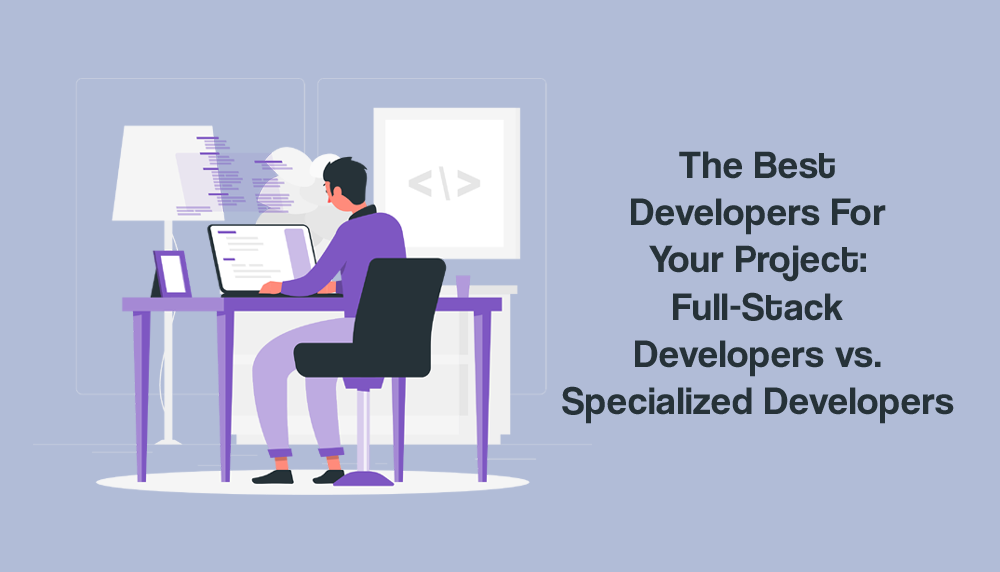The IT universe has undergone a dramatic change over the past decade, and organizations must adapt. To compete effectively, startups need to decide whether to work with highly skilled Full-stack vs Specialized Developers.
But is it better to work with a specialist or a jack-of-all-trades professional? Let’s find out who full stack and specialized developers are.
Who is a Full Stack Developer?
Full-stack developers work efficiently with both the front end and backend of an application or website. They are highly skilled programmers who can build user-facing websites, work with databases, and collaborate with clients during a project’s planning phases.
Full-stack programmers have experience in these areas:
- UI/UX design
- Frontend development (React, Angular, Vue.js, Node.js)
- Markup languages (CSS, HTML)
- Backend development (NET, Java, PHP)
- Software testing (Katalon studio, Selenium, TestComplete, Postman)
- Databases (MongoDB, Firebase, MySQL, PosterSQL)
- Architecture, scalability, and the project roadmap
Contrary to popular belief, full-stack software engineers do not necessarily write every website code themselves. They often spend most of their time on either the frontend or backend code.
Furthermore, writing code is a small part of their work. Developers can use a wide variety of frameworks, customizable tools, and libraries instead of writing everything from scratch.
This is why competent knowledge of both frontend and backend frameworks makes full-stack developers attractive prospects for businesses.
Who is a Specialized Developer?
As you may have guessed, specialist developers are experts in one particular discipline. This does not mean they lack the understanding to build and deliver apps like senior full-stack developers.
It simply means they are the go-to experts for specific areas like database design, entity framework, and domain modeling.
Now that you know the basic difference, let’s look at the pros and cons of each profession.

Full Stack Developers: Pros
-
Versatility and Problem-Solving
Full-stack developers are well-versed in diverse stages of software development like QA testing, frontend, and backend. This versatility helps them quickly identify and solve multi-purpose issues, especially when multiple developers work on different project aspects. Without a full-stack developer, specialized developers might need to call a meeting to identify a problem. This time-consuming process can affect the product’s time-to-market.
-
Flexibility and Efficiency
Full-stack programmers offer excellent flexibility. They easily switch between client-side and service-side tasks. This reduces development time and eliminates misunderstandings between frontend and backend teams. There is no need for constant meetings to explain issues between different development sides.
-
Cost-Effectiveness
Hiring one full-stack developer can often replace two or more specialized developers. This significantly reduces the workforce required for a project, ultimately lowering hiring costs.
-
Quick Learning Ability
Full-stack developers possess all-round knowledge, which helps them learn new skills quickly.
-
Rapid Issue Identification
Full-stack developers quickly identify project issues. Their awareness of every software development stage helps them resolve problems fast, reducing the required fix time.
-
Fewer Meetings
Involving a full-stack developer minimizes team meetings. This saves time and helps deliver the project on schedule.
-
Quick Delivery
Full-stack developers adeptly switch between server and client sides. This independence, compared to specialized programmers, reduces overall development time.
Anything that has advantages also has a few disadvantages. Here are the drawbacks of full-stack developers.

Full Stack Developers: Cons
-
Unclear Responsibility Control
A team of full-stack developers sounds great until they work on large, cohesive parts of a project instead of splitting work into small tasks. This makes it challenging for team members and customers to define the project’s completeness at any point.
-
Struggle to Keep Up with Trends
Full-stack developers work in many fields. However, this can hinder their ability to stay abreast of the latest tools and technologies that evolve constantly.
-
Risk-Prone Time Management
When several full-stack developers handle major project aspects, it can lead to poor time management. A high workload with clusters of unfinished tasks may arise. This can hamper the entire project as programmers struggle to complete old tasks instead of focusing on new ones.
-
Difficulty in Project Tracking
Full-stack developers often work on huge portions of a project at a time. The project’s comprehensiveness makes it difficult to monitor progress effectively.
-
Non-Availability
Recruiting a full team of full-stack developers is challenging. They are often unavailable in the market. They frequently take on vast project sections, becoming central, irreplaceable resources.
Specialized Developers: Pros
-
Always Up to Date
Specialized developers focus on specific areas. This makes it easy for them to stay current with the latest trends in their niche.
-
Top-Notch Project Quality
Hiring specialized developers means clients receive exceptionally high-quality work. These professionals are skilled and well-versed in their technology. The quality they deliver is always superior to that of full-stack developers.
-
Convenient Responsibility Allocation
When specialized developers work on a project, allocating responsibilities becomes efficient and comfortable. Team members know what is expected of them based on project needs.
-
Easy Project Tracking
Teams can split the entire work into smaller tasks for each specialized developer. This makes project tracking straightforward.
-
Easy to Hire
Based on project requirements, organizations can easily select the desired number of professionals from the available human resources. Therefore, specialized developers are easier to hire since they are nearly always available.
